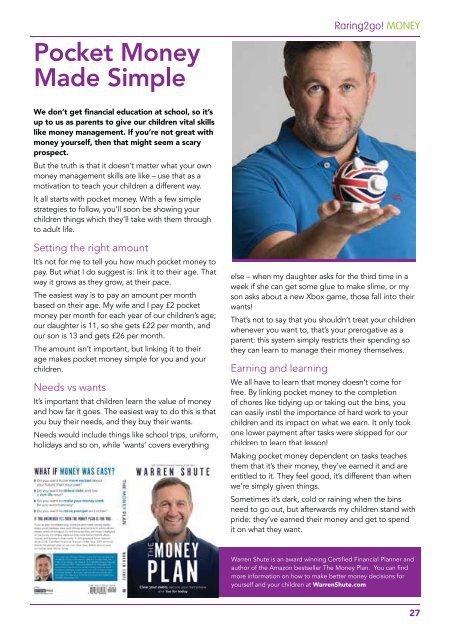Raring2go! Banbury Bicester Burford: Cotswolds
A fun and vibrant magazine aimed at the parents and carers of primary school aged children and tweenagers. Full of places to go, things to do and interesting relevant articles.
A fun and vibrant magazine aimed at the parents and carers of primary school aged children and tweenagers. Full of places to go, things to do and interesting relevant articles.
You also want an ePaper? Increase the reach of your titles
YUMPU automatically turns print PDFs into web optimized ePapers that Google loves.
Pocket Money<br />
Made Simple<br />
<strong>Raring2go</strong>! MONEY<br />
<br />
<br />
<br />
<br />
<br />
But the truth is that it doesn’t matter what your own<br />
money management skills are like – use that as a<br />
motivation to teach your children a different way.<br />
It all starts with pocket money. With a few simple<br />
strategies to follow, you’ll soon be showing your<br />
children things which they’ll take with them through<br />
to adult life.<br />
Setting the right amount<br />
It’s not for me to tell you how much pocket money to<br />
pay. But what I do suggest is: link it to their age. That<br />
way it grows as they grow, at their pace.<br />
The easiest way is to pay an amount per month<br />
based on their age. My wife and I pay £2 pocket<br />
money per month for each year of our children’s age;<br />
our daughter is 11, so she gets £22 per month, and<br />
our son is 13 and gets £26 per month.<br />
The amount isn’t important, but linking it to their<br />
age makes pocket money simple for you and your<br />
children.<br />
Needs vs wants<br />
It’s important that children learn the value of money<br />
and how far it goes. The easiest way to do this is that<br />
you buy their needs, and they buy their wants.<br />
Needs would include things like school trips, uniform,<br />
holidays and so on, while ‘wants’ covers everything<br />
else – when my daughter asks for the third time in a<br />
week if she can get some glue to make slime, or my<br />
son asks about a new Xbox game, those fall into their<br />
wants!<br />
That’s not to say that you shouldn’t treat your children<br />
whenever you want to, that’s your prerogative as a<br />
parent: this system simply restricts their spending so<br />
they can learn to manage their money themselves.<br />
Earning and learning<br />
We all have to learn that money doesn’t come for<br />
free. By linking pocket money to the completion<br />
of chores like tidying up or taking out the bins, you<br />
can easily instil the importance of hard work to your<br />
children and its impact on what we earn. It only took<br />
one lower payment after tasks were skipped for our<br />
children to learn that lesson!<br />
Making pocket money dependent on tasks teaches<br />
them that it’s their money, they’ve earned it and are<br />
entitled to it. They feel good, it’s different than when<br />
we’re simply given things.<br />
Sometimes it’s dark, cold or raining when the bins<br />
need to go out, but afterwards my children stand with<br />
pride: they’ve earned their money and get to spend<br />
it on what they want.<br />
<br />
<br />
more information on how to make better money decisions for<br />
yourself and your children at <br />
27


